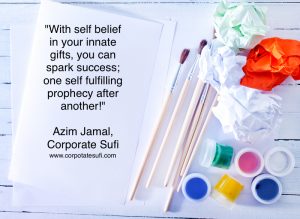
Self-Fulfilling Prophecy
What we choose to believe is a decisive part of how we choose to experience life. So be careful of

What we choose to believe is a decisive part of how we choose to experience life. So be careful of

You can have the greatest idea or product, the best branding and market positioning, but if your team members do

First – Craft a Wow statement you would want to articulate to either your creator when you report back or

What you believe in is what you will ultimately invite into your life. The universe is an open field of

Most of us judge others based on who we are, not who they are. We think we know a lot

You have many unused gifts buried inside you. Some you are aware of, others you have yet to clue into.
Following the introduction of the SPARK series four weeks ago, I have covered the key tenets of Service, Purpose and
Over the last couple of weeks, I have been sharing with you the unique elemental traits of SPARK. So far,
Last week I covered the essence of Service on our journey to SPARK success on the SPARK Arc. This week, I will dive
